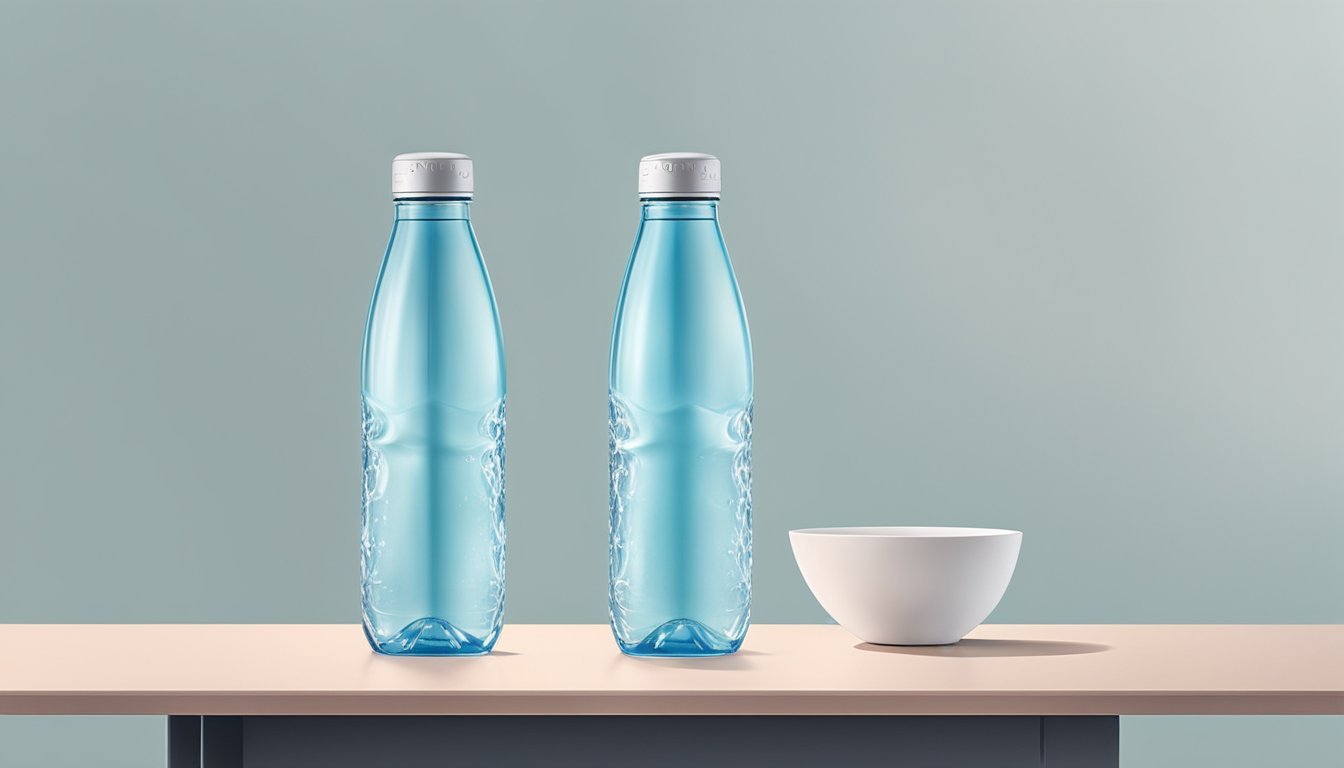Evian vs. Origin
Which Bottled Water is Better for You?
Bottled water enthusiasts often find themselves debating over which brand reigns supreme. When it comes to Evian and Origin, the choice hinges on a blend of taste, quality, and sustainability. Evian's source in the French Alps provides a distinct mineral profile that some consumers find preferable due to its high calcium and magnesium content.
Comparatively, Origin distinguishes itself with a pure taste that stems from its specific filtration and bottling processes. Both brands emphasize their commitment to preserving the natural environment from which their waters originate. For those who prioritize mineral content in their water, Evian may be the better option.
Nevertheless, personal taste preferences play a key role in decision-making. Consumers looking for a clean, unaltered taste might lean towards Origin. Each brand brings unique qualities to the table, making the choice between them a matter of personal preference rather than a definitive better option.
The Essence of Bottled Water
Bottled water varies greatly depending on its type, source, and the processes it undergoes. Key distinctions include the origin, mineral content, and whether the water is naturally filtered or treated.
Understanding Bottled Water
Bottled water can be categorized into several types. Spring water comes from an underground formation and flows naturally to the earth's surface. Natural spring water retains the minerals it acquires from the underground source.
Mineral water has specific proportions of certain minerals like calcium and magnesium, measured at the source. It can be still or sparkling. Artesian water is sourced from a well that taps an aquifer, where the pressure pushes the water to the surface.
Purified water undergoes processes like distillation, deionization, or reverse osmosis to remove contaminants and minerals. While it lacks the natural mineral content of spring or mineral water, it provides a consistent and pure option.
The Journey from Source to Bottle
The journey of bottled water begins at its source, which can significantly affect its quality. Spring or artesian waters are collected where they naturally emerge or from wells. The extraction must maintain the balance and sanctity of the source.
Following extraction, the water undergoes filtering and purification processes, particularly for purified water, to ensure safety and quality. Even for natural spring and mineral waters, minimal treatment like UV filtration ensures it meets health standards without compromising natural mineral content.
Packaging plays a crucial role in preserving water quality. Brands like Evian use 100% recycled PET plastic to bottle waters, aiming for sustainability. From source to bottling, maintaining the water's mineral integrity and freshness is key.
Evian: The Brand and the Source
Evian, a premium bottled water brand, is well-known for its exceptional source in the French Alps and its unique natural filtration process. Delving into its origin and filtration method, the brand’s reputation for purity and quality becomes clear.
Origin of Evian: French Alps Natural Spring
Evian water originates from several natural springs near Évian-les-Bains, located on the south shore of Lake Geneva in the French Alps.
Notable among these is the Cachat Spring, renowned for its purity. The spring’s location in a pristine environment ensures minimal contamination. Evian's connection to these natural springs imbues it with unique mineral characteristics.
The glaciers in the French Alps contribute to the formation of these springs.
This process results in water with a balance of minerals, including calcium and magnesium, which are beneficial for health.
Natural Filtration Process in the French Alps
Evian water undergoes a unique natural filtration process as it travels through the glacial rocks and sands of the French Alps.
Over several years, glacial rocks filter the water, removing impurities while retaining essential minerals.
Layers of glacial sand further purify the water, adding to its clarity and purity.
This extended filtration process ensures that Evian’s mineral water is not only clean but also rich in natural electrolytes.
The process by which the water collects a specific mineral content produces a balanced taste and promotes overall well-being.
Evian’s consistent quality is a direct result of this rigorous natural filtration method.
Origin: Analysis of the Brand
Origin Water, known for its distinct production methods and commitment to sustainability, presents a compelling option for consumers evaluating bottled water choices.
Source and Production of Origin Water
Origin Water sources its water from pristine natural springs, ensuring high-quality and clean water. The springs are often located in remote, undeveloped regions to maintain purity.
Water is then filtered naturally through layers of rock, enhancing its mineral content.
Production processes emphasize minimal environmental disruption. Spring water collection is carefully managed to preserve the ecosystem. Advanced filtration systems maintain water quality without the need for extensive chemical treatments, which helps in retaining its natural taste and beneficial minerals.
Environmental Initiatives and Sustainability
Origin is recognized for its strong environmental initiatives. Packaging is a major focus, with efforts to reduce plastic waste.
The brand uses recycled plastic bottles and encourages consumers to recycle after use. Additionally, Origin invests in research for biodegradable alternatives. Prominent sustainability programs include reforestation projects and energy-efficient practices in production facilities.
These initiatives help decrease the carbon footprint associated with bottled water, making Origin a more eco-friendly choice than many competitors.
Comparing Taste and Purity
Evian and Origin offer distinct taste experiences due to their unique sources and mineral compositions. Understanding these differences can help consumers make an informed choice based on their preferences for flavor and water quality.
Flavor Profile Distinctions
Evian is sourced from the French Alps, imparting it with a clean, crisp taste often described as smooth and refreshing.
The water undergoes a natural filtration process through glacial sand and rock, enriching it with a balanced mineral content.
Origin, compared to Evian, presents a different flavor profile, shaped by its own source and mineral spectrum.
Consumers often note Origin's flavor as slightly more robust, likely due to its distinct mineral makeup.
Assessment of Water Quality
Evian boasts a reputation for purity, thanks to its protected source in the Alps. This natural filtration reduces the presence of common tap water contaminants, making it a highly sought-after option.
Its mineral content includes calcium, magnesium, and bicarbonates, which contribute to its clean taste and hydration benefits.
Origin also emphasizes purity, employing advanced filtration systems to ensure minimal contaminants.
While its filtering methods differ from Evian's natural process, Origin maintains high standards, resulting in a water quality that stands out in the market.
Both brands assure consumers of high-purity water, but each offers a unique blend of minerals and filtration methods that cater to different preferences.
Health and Hydration Factors
Evaluating the health and hydration benefits of bottled water involves examining mineral content and its impact on the body.
Mineral Content and Benefits
Mineral content is crucial in bottled water. Evian is rich in minerals like calcium, magnesium, potassium, and sodium. These minerals support various aspects of health.
Calcium: Essential for bone health and muscle function. Evian contains around 80 mg/L of calcium, promoting strong bones.
Magnesium: Important for muscle contraction and relaxation. Evian has about 26 mg/L, aiding in muscle health.
Potassium: Regulates fluid balance and nerve function, with Evian providing a small but significant amount.
Sodium: Involved in fluid balance and digestion. Evian contains manageable levels that support overall health without excess intake.
Hydration and Body Health
Proper hydration is vital for overall health. Evian's balanced mineral composition enhances hydration efficiency.
Hydration Efficiency: The minerals in Evian help the body absorb and retain water, ensuring effective hydration.
Body Health: Regular consumption supports optimal fluid balance, digestion, and muscle function. It also prevents dehydration, which can lead to various health issues.
Additional Benefits: Enhanced bone and muscle health, improved digestion, and better fluid balance are some benefits linked to Evian's mineral content and hydration properties.
Technical Analysis: pH and Mineral Levels
In comparing Evian and Origin bottled waters, it's essential to evaluate their pH and mineral content. This section breaks down the importance of pH balance and the significance of minerals in determining the overall quality of these waters.
Importance of pH Balance
pH levels indicate the acidity or alkalinity of water, which affects its taste and interaction with minerals. Evian has a pH of 7.07, making it slightly alkaline. Origin's pH is not specified, but it should ideally fall between 6.5 and 8.5 for a balanced taste.
A neutral pH of 7 is optimal for the body's natural balance. Alkaline water can help neutralize acid in the bloodstream, potentially boosting overall hydration and health.
Significance of Minerals in Water
Minerals like calcium, magnesium, and bicarbonate are crucial for health. Evian is known for its rich mineral content, including calcium and magnesium, contributing to strong bones and muscle function.
Origin water also should contain essential minerals to provide a balanced electrolyte composition. These minerals enhance the water's taste and offer physiological benefits, such as maintaining electrolyte balance and supporting metabolic functions.
Both Evian and Origin aim to deliver a well-rounded mineral composition to their consumers. An evaluation of these elements can help determine which water offers better health benefits.
The Environmental Impact of Bottled Water
Bottled water production and transport significantly impact the environment, affecting both ecosystems and carbon emissions. Understanding these effects helps consumers make more informed choices about their water sources.
Bottle Production and Recycling
The manufacturing processes for bottled water require substantial amounts of raw materials and energy.
Plastic: The majority of bottled water is sold in plastic bottles, primarily made from polyethylene terephthalate (PET). Producing PET not only uses non-renewable resources like crude oil and natural gas but also releases harmful emissions.
Recycling Rates: Although plastic bottles are recyclable, recycling rates remain low. According to recent data, only about 30% of plastic bottles are recycled globally. The remaining waste contributes to pollution and environmental degradation.
Waste Management: Effective waste management systems are crucial. Brands like Evian have initiated recycling programs and use recycled PET for new bottles, aiming for a circular economy. These efforts help mitigate the environmental impacts but rely heavily on consumer participation and efficient recycling infrastructure.
The Carbon Footprint of Water Brands
The carbon footprint of bottled water comprises the emissions from production, transportation, and disposal.
Production: The production of plastic bottles is energy-intensive. It involves stages like extraction, refining, and polymerization, each contributing to greenhouse gas emissions.
Transportation: Bottled water often travels long distances from source to market. Transporting water over extensive routes, whether by road, rail, or ship, adds to the overall carbon footprint.
Local vs Imported Brands: Local water brands usually have lower transportation-related emissions compared to imported ones. Evian, sourced from the French Alps, may have a higher footprint when shipped internationally compared to more localized brands like Ozarka or Origin.
By focusing on sustainable practices in bottle production and choosing brands with lower transportation emissions, consumers can significantly reduce the environmental impact of their bottled water choices.
More About Evian
Evian vs Mountain Valley Spring Water: Which Bottled Water is Better?
Evian vs Richard's Rainwater: Which Bottled Water is Better?
Evian vs Whole Foods Italian Still Mineral water: Which Bottled Water is Better?



